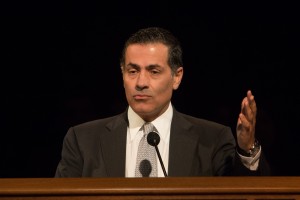
Vali Nasr, dean of the Johns Hopkins School of Advanced International Studies, clarified Middle Eastern issues at the University Forum on Oct. 21.
His world was uprooted in 1979 due to armed insurgencies, so his family moved from Syria to Salt Lake City. He was in the eye of the storm and able to watch American reactions.
“It became the mission for my life, first in academia, then in government, to provide understanding (about the Middle East),” Nasr said.
He began the forum by explaining the fundamentals of why the U.S. is involved with the Middle East. It’s not about the U.S. reliance on the Middle East for oil; most of the Middle East’s oil does not even come to America but goes to Asia.
With 9/11 and the rise of the Islamic State in Iraq and Syria, known as ISIS, “Terrorism is really worrisome to us,” Nasr said. He claimed that terrorism is a main issue that defines U.S. involvement with the Middle East.
He said the other issue is that many Americans are concerned about Israel. As long as Israel’s government resides in the Middle East, America will have an interest in the Middle East.
Nasr said secularism in politics has failed in the Middle East. Government has never been able to provide Arabs with stability, economic development or triumphs in war.
Nasr thinks Arabs will turn to religion to facilitate their needs until secular government can deliver something good.
Islam is divided between Shia and Sunni Muslims. Being Shia or Sunni becomes Arabs’ main identity and defines how their lives operate. Nasr used the example of a Shia Muslim not being able to get a bank loan because he was not Sunni.
The U.S. helped create the first Arab Shia state, since Sunni Muslims usually dominated. ISIS wants to undo what the U.S. achieved in 2003, because the Sunnis are used to ruling.
ISIS has fashioned itself as an Islamic caliphate or state, which draws young Muslims based on its appeal to power. ISIS is fighting for Sunni rule.
“(It) is very appealing to a region that has been humiliated time after time in war after war,” Nasr said.
Middle Eastern boundaries, which were somewhat arbitrarily drawn in 1918, are collapsing. ISIS threatens government leaders, which puts more pressure on the U.S. to act quickly.
“This is too big a problem … (for) a quick fix,” Nasr said. He said the long-term solution requires economic growth and business.
Nasr said Middle Eastern states are captured in economies that are secluded from the rest of the world or dominated by government. He said the U.S. is good at building economic growth and business.
“When the dust settles (in the Middle East), this is actually the task before us,” Nasr said.
Nasr is a best-selling author, Carnegie Scholar and member of the U.S. Department of State Foreign Affairs policy board.




